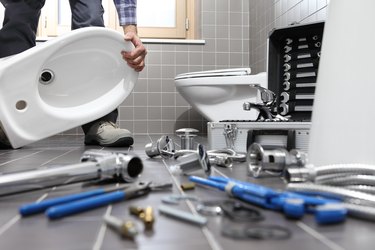
Yes, absolutely, fumes can be harmful when replacing a toilet, but they can be kept at a minimum and shouldn't pose a health risk if you work reasonably quickly and keep the drainpipe covered between removal and installation. Sewage gases are toxic and also flammable. The bigger risk is prolonged or intense inhalation of these gases, rather than short-term exposure during the project of replacing a toilet, but caution is still prudent.
Tip
Sewage gases are emitted from open toilet drain pipes and definitely can be harmful, especially over a prolonged period, particularly for children and those with breathing ailments. Plugging or covering the pipe immediately and working efficiently in a well-ventilated space can minimize any effects.
Video of the Day
How Dangerous Is It?
There are medical cases documented of people who have gotten stuck inside a septic tank without a safety mask for just 15 or 20 minutes and have died, such as a case cited in the November 2016 issue of the Journal of Anesthesia & Critical Care: Open Access. That's an extreme situation and is nothing like switching out a toilet, but it's a good starting point for understanding the risks.
Video of the Day
The Gaseous Culprits
The problem with sewage comes from two specific gases emitted: methane and hydrogen sulfide. Other harmful gases are carbon dioxide, sulfur dioxide and nitrous oxides. Methane is usually most abundant, and it stinks, but it's also extremely flammable.
At low levels, methane isn't much of a problem, but when it continues to build, things go wrong, because methane displaces oxygen. That means, when working in a small bathroom and allowing the sewage gases to fill it, you may not be inhaling oxygen. Plus, the flammable nature increases as volume does, and if someone fires up a gas stove or lights a cigarette nearby, it could be catastrophic with large doses of atmospheric methane.
Hydrogen sulfide is also toxic. Low doses are sufficient to irritate the eyes and throat and even pose breathing problems for people with asthma. High doses or prolonged exposure affect just about everyone and can cause headaches, balance problems, nervous system issues, memory issues and more. While ammonia is among the dangerous gases found in sewage, it's seldom at levels that would be really toxic to people — but when combined with the other assailants, it certainly does not help.
Safety First: Working With Care
If you're switching out a toilet, you don't have to panic. Simply be organized. Ensure you've got a rag to stick in the pipe until you're ready to put the new toilet in place.
Ensure the space is well ventilated. Keep kids out of the room, since they're affected by lower levels of the gases more than adults, and keep the door and any nearby windows open. If you typically endure allergies or you have asthma, wearing a ventilating or respiration mask can prevent any ill effects.
Got Sewage Smells?
If you're not working on the toilet and you've been getting a whiff of something sulfuric and foul in your home, it doesn't necessarily mean it's coming from the toilet. It's surprising just how many places can emit sewage smells in your home — even your washing machine can be the culprit. Whatever the cause, the odors and the gases that cause them are nothing to ignore, as the buildup of methane can become a ticking timebomb in a family home, especially when open flames are present.
Call a professional and get to the bottom of it. Remember, if the sewer line is the problem, it's the homeowner's responsibility to repair it, not the city's!